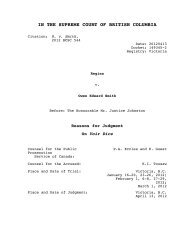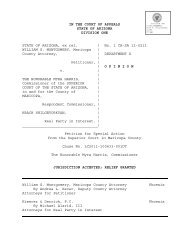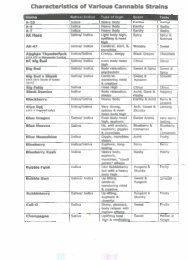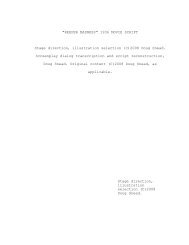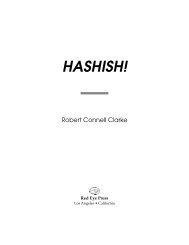3. Umbruch 4.4..2005 - Online Pot
3. Umbruch 4.4..2005 - Online Pot
3. Umbruch 4.4..2005 - Online Pot
Create successful ePaper yourself
Turn your PDF publications into a flip-book with our unique Google optimized e-Paper software.
86 J. Fernández-Ruiz et al.<br />
glial cells (mainly reactive microglia) and impact on neurons to induce neurodegeneration<br />
(see [67] for review). For instance, IL-6 and TNF-α have been<br />
shown to promote demyelination, thrombosis, leukocyte infiltration and<br />
blood–brain-barrier disruption (see [68] for review). By contrast, glial cells<br />
(mainly astrocytes) are able to produce prosurvival factors which play a role in<br />
neuronal protection [69]. Both phenomena occur in ischemia [70], trauma [71],<br />
PD [72], HD [73], AD [74, 75] and other diseases [67]. In addition, inflammation<br />
can also elicit neurodegeneration through the activation of autoimmune<br />
responses against brain antigens, as happens in the case of MS and other<br />
demyelinating diseases (see [4, 76] for review). Cannabinoid agonists are able<br />
to reduce the inflammation that occurs in these diseases. This effect is possibly<br />
caused by local effects on glial cells, exerted by either reducing the release of<br />
cytotoxic factors or increasing the production of prosurvival molecules (see<br />
Fig. 1, and [4–6, 24, 25, 68] for review). This is consistent with the idea that the<br />
endocannabinoid signaling system would play crucial roles in glial cells both in<br />
healthy and pathological conditions (for review, see [24, 68]).<br />
The anti-inflammatory potential of cannabinoid agonists in neurodegenerative<br />
diseases has been recently addressed in several studies that have revealed<br />
potent anti-inflammatory effects of selective agonists for CB 1 (arachidonoyl-2chloroethylamide,<br />
ACEA) or CB 2 (JWH-133, JWH-015) receptors and also of<br />
non-selective cannabinoid agonists (see [4–6, 24, 68] for review). In part, this<br />
is the consequence of an effect of cannabinoids by protecting astrocytes and<br />
oligodendrocytes from death, which is also beneficial for neurons [77, 78]. On<br />
the other hand, cannabinoid agonists, possibly by activating CB 1 receptors<br />
[79], modulate proinflammatory cytokine production by glial cells, mainly<br />
IL-1, TNF-α, IL-6 and IL-12 which play a major role in the development of<br />
damage in neurodegenerative/neuroinflammatory conditions, such as those<br />
occurring in cerebral ischemia (see [4, 68] for review). Of particular interest is<br />
the inhibitory effect of cannabinoid agonists on the production of TNF-α since<br />
this is a major contributor to the pathophysiology of brain injury [80]. These<br />
inhibitory effects might be exerted by inhibiting the activation of the nuclear<br />
factor-κB (NF-κB), which is involved in the induction of cytokine gene expression.<br />
HU-211, which does not bind to cannabinoid receptors, was able to inhibit<br />
this transcription factor [34]. In addition, several cannabinoid agonists were<br />
able to reduce mRNA levels for certain cytokines in lipopolysaccharide-treated<br />
rat microglial cells but these effects were not cannabinoid receptor-mediated<br />
[81]. Another important inflammation-related mediator is NO, which is produced<br />
in response to immune-mediated cellular toxicity playing a role in neurodegeneration<br />
(for review, see [1, 68]). Strategies that reduce the expression<br />
of the inducible or neuronal forms of NO synthase may be neuroprotective (see<br />
[25] for review). In this sense, cannabinoid agonists have been reported to<br />
inhibit the release of NO in microglia [82], astrocytes [83], neurons [84] and<br />
macrophages [85].<br />
Glial cells may also secrete various trophic factors, such as the transforming<br />
growth factor-β, the anti-inflammatory cytokine IL-10, and neurotrophins,



